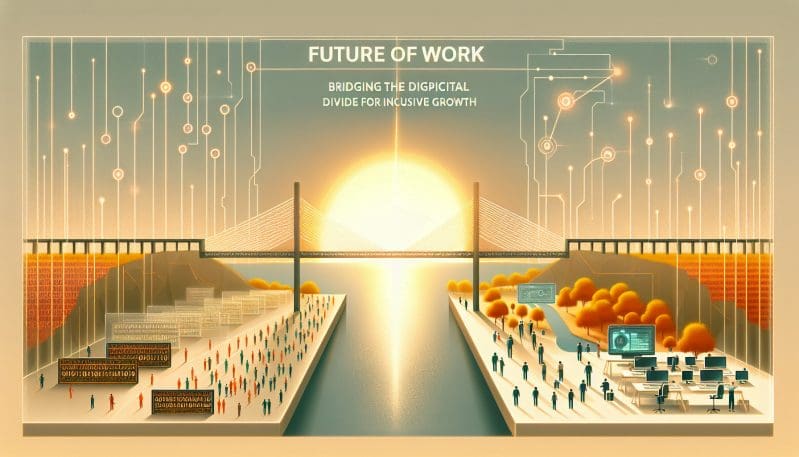Future of Work: Bridging the Digital Divide for Inclusive Growth
- Home
- Future of Work: Bridging the Digital Divide for Inclusive Growth
- Editors Desk
- January 12, 2024
- 0 Comments
In the dawn of the fourth industrial revolution, technology is advancing at an unprecedented pace, transforming the way we work, live, and connect with one another. However, this rapid digitization is giving rise to a stark digital divide. This divide separates those who possess the digital skills needed to thrive in the new economy from those who do not. As we embrace these changes, our mission at No Worker Left Behind is to ensure that the future of work is inclusive, offering opportunities for every worker to participate and succeed in the evolving workplace.
Our approach emphasizes the importance of digital literacy and upskilling, particularly for at-risk demographics, such as older workers, individuals in low-income communities, and those in industries most susceptible to automation. By empowering these groups with vital digital skills, we can fend off the risks of widening inequality and economic displacement that the digital divide portends.
To achieve this, No Worker Left Behind is spearheading initiatives that prioritize digital education and the fostering of digital competencies. Here are some pivotal strategies that could serve as a blueprint for our collaborative efforts in creating a more inclusive digital economy:
**1. Partnerships with Tech Companies: Engaging with leading technology firms is essential for accessing cutting-edge resources and expertise. Through these partnerships, we aim to offer up-to-date training programs and platforms that provide hands-on experience with the latest digital tools. Companies can contribute by developing tailored curricula, providing mentorship, and offering internship opportunities that help workers gain practical understanding and application of new technologies.
**2. Leveraging Government Policies: Effective public policies can incentivize and support the upskilling of the workforce. We advocate for policies that allocate funds for digital education programs and create tax benefits for companies that invest in employee training. By acting as a liaison between policymakers and the workforce, No Worker Left Behind can ensure that government initiatives are aligned with the needs of the workers and the realities of the labor market.
**3. Community-Based Initiatives: Grassroots efforts are vital in reaching and engaging at-risk populations. By collaborating with local organizations, libraries, and educational institutions, we can extend the reach of our programs to communities that may otherwise be overlooked. These localized efforts can include digital literacy workshops, community coding bootcamps, and career counseling that focuses on the importance of digital skills in the job market.
**4. Creating Accessible Online Resources: In today’s digital world, the internet is a vast repository of learning materials. We are dedicated to curating and developing accessible, high-quality online resources that can help individuals learn at their own pace. These resources could range from basic computer skills modules to advanced programming courses, ensuring that every worker has the opportunity to level up their digital proficiency.
**5. Advocacy and Awareness Campaigns: Raising awareness about the digital divide and its implications is a vital aspect of our work. By running targeted campaigns, we can amplify the message that digital literacy is a necessity, not a luxury, in the modern economy. These campaigns can also highlight success stories of individuals who have transformed their careers through upskilling, thereby inspiring others to follow suit.
Our commitment at No Worker Left Behind is unwavering: we are determined to bridge the digital divide and foster a future where inclusive growth is not just a goal but a reality. By collaborating with stakeholders across the spectrum and implementing targeted, impactful programs, we are poised to make significant strides towards a future where every worker is valued, every skill is harnessed, and no potential is left untapped.
As readers and advocates, you can contribute to this mission by sharing our vision, participating in our programs, and spreading the word. Together, we can ensure that the digital economy is an opportunity for all, not a barrier. Let’s pave the way for a future that’s not only technologically advanced but also socially equitable and economically inclusive.
Choose Layout
Main Color Scheme
- RTL Version
- LTR Version

